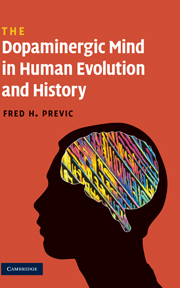https://pdfs.semanticscholar.org/5517/864259d1a72c37c27433bc0c0a6bdc5d0018.pdf
What does it mean to be human? There are many theories of the evolution
of human behavior which seek to explain how our brains evolved to
support our unique abilities and personalities. Most of these have
focused on the role of brain size or specific genetic adaptations of the
brain. In contrast, Fred Previc presents a provocative theory that high
levels of dopamine, the most widely studied neurotransmitter, account
for all major aspects of modern human behavior. He further emphasizes
the role of epigenetic rather than genetic factors in the rise of
dopamine. Previc contrasts the great achievements of the dopaminergic
mind with the harmful effects of rising dopamine levels in modern
societies and concludes with a critical examination of whether the
dopaminergic mind that has evolved in humans is still adaptive to the
health of humans and to the planet in general.
Dopamine, Altered Consciousness, and Distant Space with Special Reference to Shamanic Ecstasy
Serotonergic systems
interact with dopaminergic ones in many parts of the brain in a mostly
inhibitory manner (see Kapur & Remington, 1996; Mandell, 1980; Previc,
2006), with reduced serotonin levels leading to elevated dopamine levels,
thereby explaining why drugs such as LSD can model dopaminergically
mediated psychosis.


No comments:
Post a Comment